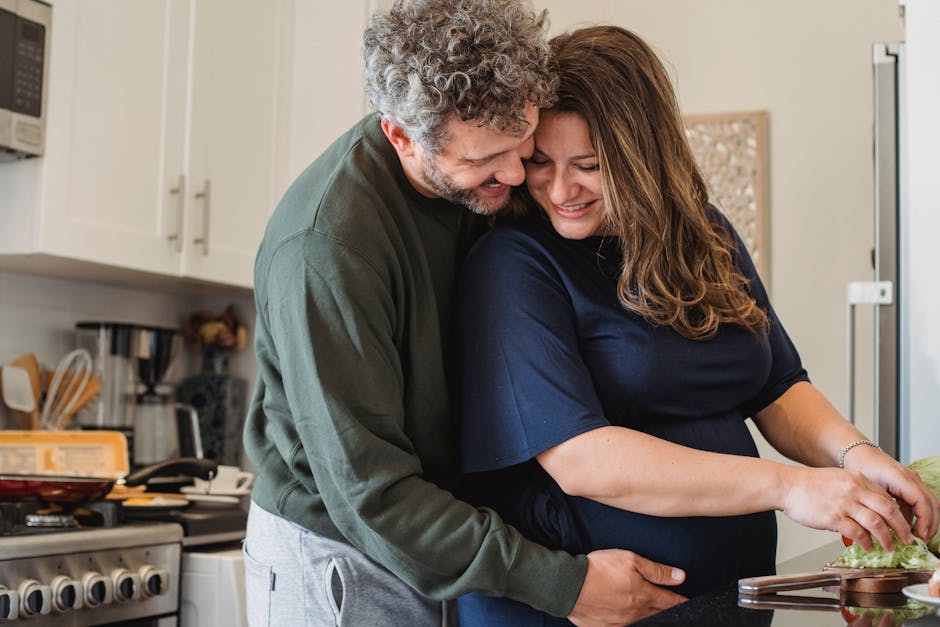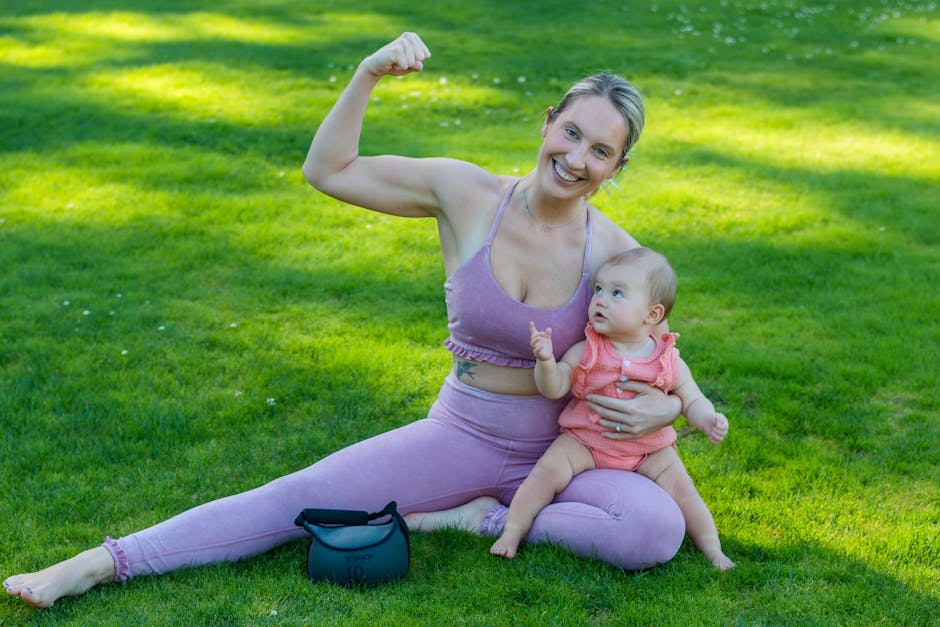Carrying a baby for nine months can leave its mark, often in the form of stubborn belly fat. For many new mothers, losing this extra weight can be a top priority, driven by a desire to reclaim their pre-pregnancy physique and boost their self-confidence. However, shedding belly fat after pregnancy requires a delicate balance of patience, realistic expectations, and a strategic approach that considers the unique needs of a postpartum body.
This article will offer a comprehensive guide to help you navigate the journey towards a flatter stomach. We will begin by exploring the physiological changes that occur during and after pregnancy, shedding light on why belly fat can be particularly persistent. Next, we will delve into practical strategies for achieving sustainable weight loss, including dietary modifications, exercise recommendations, and the importance of adequate sleep and stress management.
Finally, we will address common pitfalls and misconceptions surrounding postpartum weight loss, providing realistic advice and empowering you to make informed decisions that prioritize both your physical and mental well-being.
Postpartum Belly Fat Busters

It’s common to experience a postpartum belly, but it’s important to remember that losing weight after pregnancy should be approached with patience and a focus on overall health. Here are some practical tips to help you on your journey:
1. Focus on a Balanced Diet:
- Prioritize nutrient-dense foods: Load up on lean protein, fruits, vegetables, and whole grains. These provide essential nutrients for both you and your baby.
- Hydrate: Water is crucial for breastfeeding and overall health. Aim for at least eight glasses a day.
- Limit processed foods and sugary drinks: These contribute to weight gain and can be detrimental to your health.
2. Incorporate Regular Exercise:
- Start slowly and gradually increase intensity: Listen to your body and avoid overexertion, especially in the early postpartum period.
- Find activities you enjoy: This will make it more likely you’ll stick with it. Consider walking, swimming, yoga, or low-impact exercises.
- Aim for at least 30 minutes of moderate-intensity exercise most days of the week: This can help boost your metabolism and burn calories.
3. Get Enough Sleep:
- Prioritize sleep whenever possible: Lack of sleep can disrupt hormones that regulate appetite and metabolism.
- Create a sleep-conducive environment: Make sure your bedroom is dark, quiet, and cool.
4. Manage Stress:
- Stress can lead to weight gain and make it harder to lose weight. Find healthy ways to manage stress, such as meditation, yoga, or spending time in nature.
5. Be Patient and Realistic:
- Losing weight too quickly can be harmful to your health and can make it harder to maintain weight loss in the long term. Aim for a healthy and sustainable rate of weight loss, around 1-2 pounds per week.
- Celebrate your progress: Don’t get discouraged by setbacks. Focus on the positive changes you’re making and the progress you’re making.
Important Note: It’s always a good idea to consult with your doctor before starting any new diet or exercise program, especially if you have any underlying health conditions. They can help you develop a safe and effective plan that meets your individual needs.
Nourishing Your Body After Birth

The journey back to your pre-pregnancy body after childbirth is a personal one, and nourishing your body is key. Remember, rushing to lose weight can be detrimental to your health and well-being. Focus on fueling your body with nutritious foods that support both you and your baby.
Prioritize whole, unprocessed foods like fruits, vegetables, lean proteins, and whole grains. These provide essential nutrients for both you and your baby, especially if you’re breastfeeding.
Stay hydrated! Water is vital for your body’s functions, particularly after giving birth. It helps with energy levels, milk production (if breastfeeding), and aids in digestion.
Listen to your body. It’s essential to honor your hunger cues and eat when you’re truly hungry, not out of boredom or stress. Avoid restrictive diets that might limit essential nutrients.
Instead, focus on making gradual, sustainable changes.
Remember, building back your strength and fitness takes time. Be patient with yourself and celebrate your body’s amazing ability to bring life into the world. Focus on nourishing yourself from the inside out, and the weight loss will naturally follow as you prioritize your overall health and well-being.
Exercise Strategies for New Moms

Once you’re cleared by your doctor, incorporate low-impact exercises like brisk walking, swimming, or water aerobics into your routine. These activities are gentle on your joints, and can help you gradually build strength and endurance. Remember, consistency is key.
Aim for at least 30 minutes of moderate-intensity exercise most days of the week. If you find it difficult to dedicate a large chunk of time, break it up into shorter sessions throughout the day. A 10-minute walk after lunch and a 15-minute yoga session before bed can make a significant difference.
Don’t underestimate the power of core strengthening exercises.
Engage your core muscles, which support your spine and help you regain your abdominal strength. Include moves like pelvic tilts, bird dog, and modified planks in your workout routine. These exercises can also help improve posture and alleviate back pain, common issues after pregnancy.
As you progress, consider incorporating strength training exercises, focusing on compound movements that engage multiple muscle groups at once.
Squats, lunges, and push-ups can help burn calories, build lean muscle mass, and boost your metabolism. Remember to start with a lighter weight and gradually increase the resistance as you gain strength. Always prioritize proper form over lifting heavy weights.
Finally, don’t neglect the importance of rest and recovery.
Listen to your body and take breaks when needed. Your body needs time to heal and rebuild after pregnancy. Be patient and consistent with your exercise routine, and remember that every step you take, every rep you complete, is a step closer to your fitness goals.
Sustainable Weight Loss Habits

The key to shedding those extra pounds after pregnancy lies in building sustainable habits that you can maintain for the long haul. Crash diets and intense exercise regimens might seem appealing for quick results, but they’re often unsustainable and can even be detrimental to your health, especially while breastfeeding. Instead, focus on gradual changes that fit into your lifestyle and support your overall well-being.
Start by incorporating regular physical activity into your routine. Aim for at least 30 minutes of moderate-intensity exercise most days of the week. This could include brisk walking, swimming, cycling, or even dancing.
Remember, even small steps like taking the stairs or walking the dog can add up.
Next, prioritize a balanced and nutritious diet. Focus on whole, unprocessed foods like fruits, vegetables, lean protein, and whole grains. Minimize processed foods, sugary drinks, and excessive amounts of saturated and unhealthy fats.
Remember, breastfeeding can increase your caloric needs, so ensure you’re consuming enough to support both you and your baby.
Don’t underestimate the power of sleep. Getting adequate sleep is crucial for hormone regulation, energy levels, and overall well-being. Aim for 7-8 hours of quality sleep each night.
Finally, manage stress effectively. Stress can lead to hormonal imbalances and increased belly fat storage. Practice stress-reducing techniques like yoga, meditation, or spending time in nature.
Surround yourself with a supportive network of family and friends, and don’t hesitate to seek professional help if needed.
Remember, losing weight after pregnancy is a journey, not a race. Be patient, consistent, and kind to yourself. Celebrate small victories along the way, and focus on creating healthy habits that will benefit you for years to come.
The Importance of Rest and Sleep

It’s no secret that motherhood is demanding, and getting enough sleep can feel like a distant luxury. However, prioritizing rest is crucial for shedding that postpartum belly. When you’re sleep-deprived, your body releases more of the stress hormone cortisol, which can actually promote belly fat storage.
Aim for at least 7-8 hours of sleep per night, even if it means taking a nap during the day or asking your partner for help. Adequate sleep also supports healthy hormone regulation, which plays a vital role in metabolism and fat burning. Not only will prioritizing rest help you lose belly fat, but it will also boost your energy levels, improve your mood, and allow you to better manage the challenges of motherhood.
Prioritize Your Mental Wellness

Losing belly fat after pregnancy is a common goal, but it’s crucial to remember that your mental well-being is just as important as your physical health. The hormonal shifts, sleep deprivation, and the demands of caring for a newborn can take a toll on your mental state. Prioritizing your mental wellness can actually be a powerful tool in your weight loss journey.
Here’s why:
- Stress and Cortisol: When you’re stressed, your body releases cortisol, a hormone that can lead to increased belly fat storage. Managing stress effectively can help regulate your cortisol levels and support healthy weight management.
- Mindful Eating: Stress and emotional eating often go hand-in-hand. Taking time to practice mindful eating – paying attention to your hunger cues, savoring your food, and avoiding distractions while eating – can help prevent overeating and support healthy choices.
- Exercise Motivation: Feeling good mentally can make it easier to stick to your exercise routine. When you’re feeling positive and energized, you’re more likely to prioritize your workouts, which are essential for burning calories and building muscle.
- Self-Care is Key: Taking time for yourself, even for just a few minutes each day, can significantly improve your mental well-being. This could include things like taking a relaxing bath, reading a book, spending time in nature, or engaging in activities you enjoy.
Remember, losing belly fat after pregnancy is a journey, not a race. Be patient with yourself, focus on building healthy habits, and prioritize your mental wellness for both short-term and long-term success.
Conclusion
Recovering from pregnancy and shedding those extra pounds can be a challenging but rewarding journey. This article has provided you with a comprehensive guide, highlighting the key steps towards achieving your postpartum fitness goals. Remember, it’s essential to nourish your body with wholesome foods, engage in gentle exercise, and prioritize rest and sleep.
Establishing sustainable habits will not only help you lose belly fat but also enhance your overall well-being. Importantly, prioritize your mental health – finding support, managing stress, and celebrating milestones will make your journey much smoother. The path to a fitter, healthier you is within reach, so embrace these strategies and embark on your postpartum transformation with confidence.
Remember, it’s not about quick fixes, but about creating lasting healthy habits for a fulfilling life.
